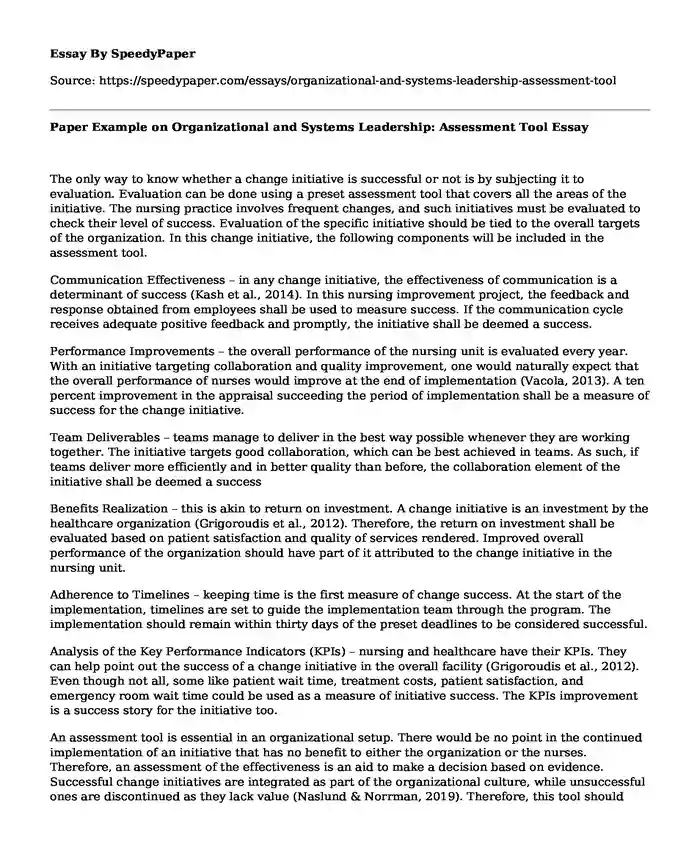
| Type of paper: | Essay |
| Categories: | Nursing management Nursing leadership Leadership management |
| Pages: | 3 |
| Wordcount: | 706 words |
The only way to know whether a change initiative is successful or not is by subjecting it to evaluation. Evaluation can be done using a preset assessment tool that covers all the areas of the initiative. The nursing practice involves frequent changes, and such initiatives must be evaluated to check their level of success. Evaluation of the specific initiative should be tied to the overall targets of the organization. In this change initiative, the following components will be included in the assessment tool.
Communication Effectiveness – in any change initiative, the effectiveness of communication is a determinant of success (Kash et al., 2014). In this nursing improvement project, the feedback and response obtained from employees shall be used to measure success. If the communication cycle receives adequate positive feedback and promptly, the initiative shall be deemed a success.
Performance Improvements – the overall performance of the nursing unit is evaluated every year. With an initiative targeting collaboration and quality improvement, one would naturally expect that the overall performance of nurses would improve at the end of implementation (Vacola, 2013). A ten percent improvement in the appraisal succeeding the period of implementation shall be a measure of success for the change initiative.
Team Deliverables – teams manage to deliver in the best way possible whenever they are working together. The initiative targets good collaboration, which can be best achieved in teams. As such, if teams deliver more efficiently and in better quality than before, the collaboration element of the initiative shall be deemed a success
Benefits Realization – this is akin to return on investment. A change initiative is an investment by the healthcare organization (Grigoroudis et al., 2012). Therefore, the return on investment shall be evaluated based on patient satisfaction and quality of services rendered. Improved overall performance of the organization should have part of it attributed to the change initiative in the nursing unit.
Adherence to Timelines – keeping time is the first measure of change success. At the start of the implementation, timelines are set to guide the implementation team through the program. The implementation should remain within thirty days of the preset deadlines to be considered successful.
Analysis of the Key Performance Indicators (KPIs) – nursing and healthcare have their KPIs. They can help point out the success of a change initiative in the overall facility (Grigoroudis et al., 2012). Even though not all, some like patient wait time, treatment costs, patient satisfaction, and emergency room wait time could be used as a measure of initiative success. The KPIs improvement is a success story for the initiative too.
An assessment tool is essential in an organizational setup. There would be no point in the continued implementation of an initiative that has no benefit to either the organization or the nurses. Therefore, an assessment of the effectiveness is an aid to make a decision based on evidence. Successful change initiatives are integrated as part of the organizational culture, while unsuccessful ones are discontinued as they lack value (Naslund & Norrman, 2019). Therefore, this tool should help make a decision about whether to continue or stop the change process. It should also act as a pointer for the organization on the direction to take when undertaking future change initiatives. Assessment may also not result in a decision to or discontinue; instead, it could help the organization to adopt necessary adjustments to make the change initiative functional. On that account, the results of the assessment should play an advisory in the decision-making process.
References
Grigoroudis, E., Orfanoudaki, E., & Zopounidis, C. (2012). Strategic performance measurement in a healthcare organization: A multiple criteria approach based on a balanced scorecard. Omega, 40(1), 104-119. https://doi.org/10.1016/j.omega.2011.04.001
Kash, K., Aaron, S., Johnson, C., & Gamm, L. (2014). Success Factors for Strategic Change Initiatives: A Qualitative Study of Healthcare Administrators’ Perspectives. PubMed. Retrieved 9 July 2020, from https://www.ncbi.nlm.nih.gov/pubmed/24611428.
Naslund, D., & Norrman, A. (2019). A performance measurement system for change initiatives: An action research study from design to evaluation | Emerald Insight. Emerald.com. Retrieved 9 July 2020, from https://www.emerald.com/insight/content/doi/10.1108/BPMJ-11-2017-0309/full/html.
Vakola, M. (2013). Multilevel Readiness to Organizational Change: A Conceptual Approach. Journal Of Change Management, 13(1), 96-109. https://doi.org/10.1080/14697017.2013.768436
Cite this page
Paper Example on Organizational and Systems Leadership: Assessment Tool. (2023, Sep 27). Retrieved from https://speedypaper.net/essays/organizational-and-systems-leadership-assessment-tool
Request Removal
If you are the original author of this essay and no longer wish to have it published on the SpeedyPaper website, please click below to request its removal:
- Nursing Essay Example: Culturally Sensitive Care
- Essay Sample on Walmart Mergers or Acquisitions and Their Impact on Company Risk
- Essay Example on Building Sales Team
- Biography of Florence Nightingale
- Free Essay. Hospitality Supervision and Training Skills
- Paper Example on How to Implement Change Using Kotter's Eight-Step Plan
- Paper Example: Relationship between Project Manager and the Systems Engineer
Popular categories




